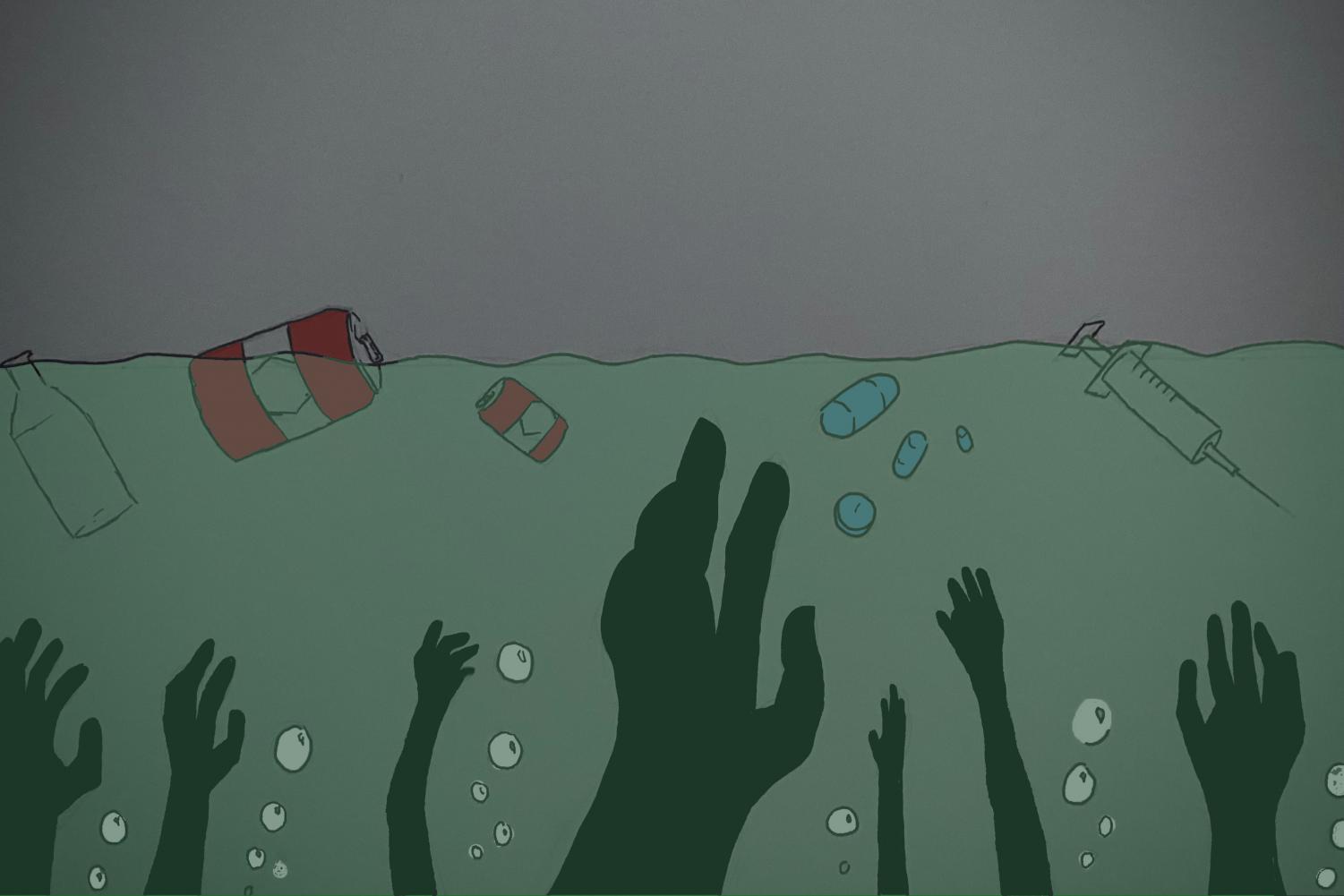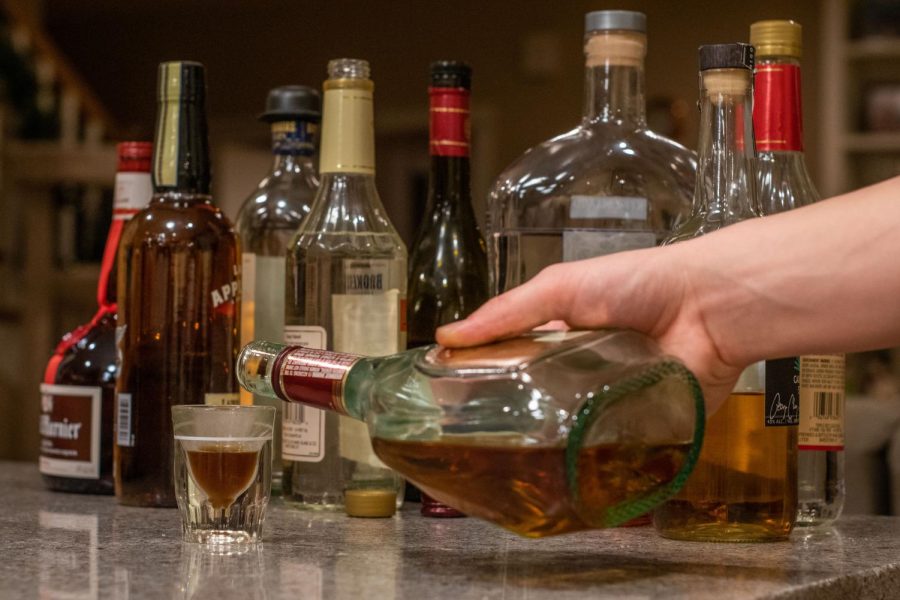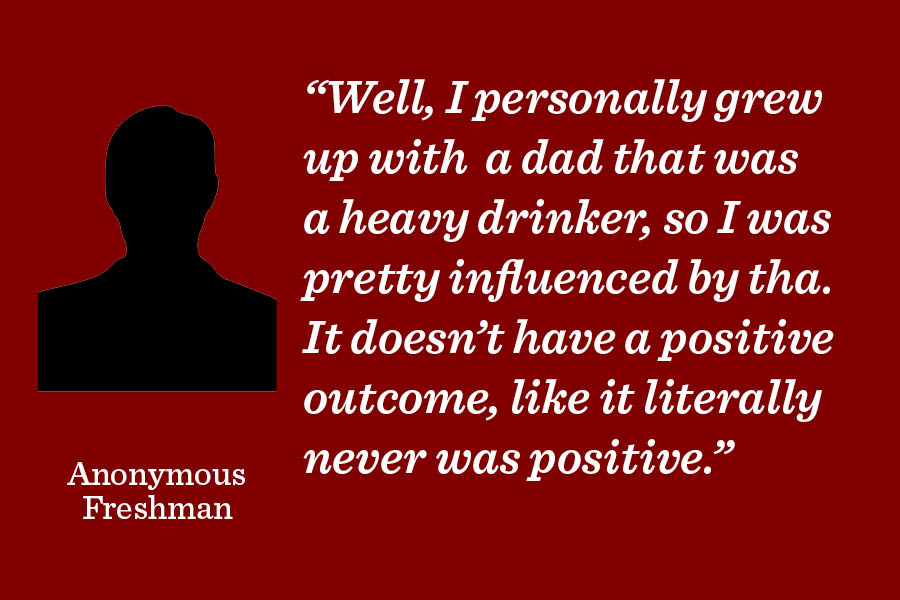Struggling in Solitude
December 11, 2020
Isolated at home, teenagers and adults alike are bored and looking for excitement. For some U-High students, drugs and alcohol seem like the escape. Although teenage substance use is nothing new, the expected behaviors have shifted with the stress and conditions of the pandemic. Without complete professional data, the Midway sought a clear picture of how substance use has changed since March.
Concerned experts unclear on teen substance use trends
Although some national data has been collected on the increase in substance use among adults, studies and data have not been finalized for substance use changes among teenagers.
With students managing U-High’s intense workload, isolated from their social circles and under the stress of living through a global health crisis, it takes no stretch of the imagination to count substance use as one of the many impacted behaviors in the lives of U-High students.
Yet, given a lack of statistics on teen substance use during the pandemic and seeming silence between students and high school counselors on the issue, it’s hard to tell exactly how students’ relationships with substances like alcohol, e-cigarettes and other drugs has changed in the past eight months during a pandemic and distance learning.
According to high school counselor Aria Choi, students have been coming to the counselors for help dealing with heightened anxiety and depression during the pandemic. Despite this, she said no students have reached out to her about substance use.
“I personally, of the five school counselors, have not received any reports of concerns with substance abuse or addiction,” Ms. Choi said. “I am also not hearing from my colleagues that they are working with students who are recording issues with substance use, it’s more again, depression, anxiety.”
This lack of communication is not new. Ms. Choi said in her four years at U-High she has only talked about substance use with two students.
Just because students have not been reaching out to the high school counselors does not mean they have avoided substance use altogether. The 2019 wellness survey reported that 38% of U-High students have had more than a few sips of alcohol, 30% have used vapor products and 25% have used marijuana.
The high school counselors aren’t the only ones finding themselves in the dark about how teens are using substances right now. There aren’t many published studies on the topic, so knowledge directly about teenage substance use trends during the pandemic is also mainly speculative, according to Andrea King, professor of psychiatry and behavioral neuroscience at the University of Chicago and a Lab parent.
“We don’t know a whole lot because it takes time to get really good data and have it published, and peer reviewed, and all those things. So I know, these data are being collected,” Dr.. King said.
Even with hard data, it could be difficult to pin down a definitive trend. According to Dr. King, the impacts of the coronavirus on a teen’s life and substance use habits vary geographically. Risk factors such as poverty and drug availability may also lead to various behaviors among teens.
“So there’s probably going to end up being a mixed bag of some kids who might have gone on and used substances this year who aren’t using them,” Dr. King said. “That may be good, and it could delay the onset. And for others, it could deepen maybe some disturbing trends they already had, and make them even more hardcore.”
Despite the lack of specific data, figures on general nationwide substance use and mental health may provide a slightly clearer picture of teen substance use as influenced by pandemic.
A study published in August by the Centers for Disease Control and Prevention showed the pandemic had the greatest impact on the mental health of young adults ages 18-24, with nearly 63% of respondents in this age group reporting symptoms of anxiety or depression related to the pandemic, and around 24.7% turning to substance use as a coping mechanism.
A study of high school students found that the effects of isolation during the pandemic has adverse effects on teen mental health in particular. A recent study of 3,300 high school students published by America’s Promise Alliance showed that 30% of respondents reported feeling depressed or unhappy, while 29% felt disconnected from their school communities.
U-High counselor Micheal Bruner is concerned about the new role isolation plays in teen substance use, and encourages students who may be struggling with addiction to seek support.
“Many students are reporting feeling disconnected. So I certainly worry about those things and my hope is that students, if they’re feeling those things, they’re able to reach out to resources that they have available to them,” Mr. Bruner said. “That might be family, that could certainly be the counselors here at school, other adults that they’re close with and even their friends to some extent, especially friends who are able to engage with them in healthy ways.”
Dr. King suggested that students struggling with addiction avoid substance-using friends who aren’t similarly committed to getting clean should look into online resources like Partnership to End Addiction and talk to trusted adults.
According to Dr. King, setting up time away from a substance can also help students experiment with finding alternative coping mechanisms.
“I suggest at least one month to give enough time to make these lifestyle changes, and three or more months is even better,” Dr. King said. “Many find that they have better alternatives and decide using drugs makes them feel worse in the long run and having this time away from using helps to make that clear.”
Isolation, boredom leave students desperate for stimulation, turning to substances
Five U-High students, each a current or former substance user, agreed to speak with the Midway on the condition that their names be withheld.
Get up. Open Schoology. Attend classes. Log off. Finish homework. Sleep. And again.
For most students, every day, one after the other, has felt like this since school began in September. This routine quickly became dull, leading people to seek excitement.
“Reality was just kind of boring, and that made me want to alter my reality by doing drugs,” one U-High senior said.
For every student, substance use looks different — the substances, the volume, the context, the reason — and it has only diversified since the March stay-at-home order isolated each user. But months of the pandemic have brought one commonality to many teen users: Substances feel like a remedy to the seemingly endless hours of boredom and loss of a normal teen experience.
Excited by the unknown and spurred on by boredom, some students are curious about trying drugs and alcohol and having their first experiences alone at home due to the pandemic.
One ninth grader said though she had tasted some wine with her parents, that her first time drinking without the consent of her parents was by herself, in her room as she planned an all-nighter for school work in November. Craving excitement, she went downstairs to her parents’ liquor cabinet.
“I was bored,” she said about her first time trying vodka. “I was like, ‘Ooh, let me be crazy’ and I’m like, ‘Have some of the vodka.’”
For students who had been using substances before the pandemic began, their substance usage increased. Junior A’s use escalated dramatically until she decided to stop using pills.
“I’m 17 days clean from pills. So that’s pretty cool,” Junior A said. “I didn’t realize how bad my situation was until I stopped taking them.”
She explained that she even experienced withdrawal symptoms.
“I felt so sick,” she said. “I couldn’t eat without getting sick, and my body ached so much.”
Prior to the start of distance learning last March, Junior A said she was smoking marijuana and using hallucinogens regularly, but ever since, she’s started drinking alcohol more frequently and using harder drugs like opioids, cocaine and MDMA. Stuck at home, her use escalated because drugs and alcohol became something she could look to for entertainment.
Eventually, she decided to stop using pills when her friend intervened, and she said she saw how her use of pills was affecting herself and those around her.
“I just saw how much my friends hated seeing me like that, and that hurt me hearing my friends share their concern for me, that made me cry…” she said.
While Junior A’s substance use changed due to intervention from a friend, for some students who drank and smoked in social contexts at parties and with friends, isolation has interrupted their substance use habits.
One sophomore, who said he generally only uses substances in a social context, feels that the constant uncertainty of the pandemic encourages him to make the most of his time with his friends. As a result, on the rare instance they’re together, they use substances more heavily than they might otherwise.
“You don’t know if you’re going to be hanging out with your friends for a while, because you don’t know if cases are going to start getting worse.You don’t know if your parents will make you lock down at home and you won’t be able to go out and see your friends,” he said. “When you’re with your friends, you don’t want to miss that opportunity.”
He said he thinks he would be drinking and smoking more if he was able to be with his friends in person, but because of the pandemic, he has nearly stopped using all substances.
Meanwhile, other students have found ways to mimic their pre-pandemic habits and still consume with their friends, but from the safety of their own homes. For Junior B, who wants to let loose to escape the monotony of being at home, Zoom calls with her friends have become a way to get drunk, to get high and to have fun.
“It would basically just be bring your choice of substance. Some of my friends would drink,” she said. “Then we would just talk and show up and play games and whatever.”
Having fun with her friends on Zoom may restore a bit of normalcy, but she anticipates that after the pandemic she will use alcohol and marijuana more frequently than before.
“I feel like I spent so much time before quarantine just being stressed out about school,” she said. “Now that I’m in quarantine, I’ve realized school is not everything, and I want to be able to have fun with my friends whenever I can, because it’s important to cherish the moment, and that’s the biggest change.”
If you or someone you know is struggling with substance use, refer to resources like Partnership to End Addiction and talk to trusted adults. If you or someone you know is in immediate danger, call 911.



